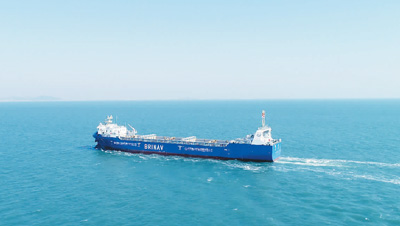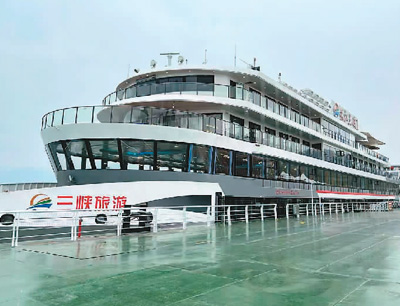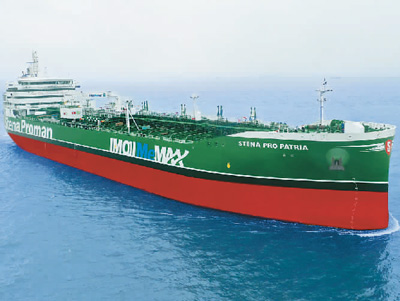China promotes green, intelligent transformation of its shipbuilding industry
China has been promoting the green and smart transformation of its shipbuilding industry by replacing traditional fuel with clean energy and applying intelligent systems to various kinds of vessels.

Photo shows China’s first autonomous 300TEU container ship “Zhi Fei” developed by Navigation Brilliance, a smart ship technology company based in Qingdao city, east China’s Shandong Province. (Photo courtesy of Navigation Brilliance)
The “Yangtze River Three Gorges 1,” the world’s largest electric cruiser with the largest battery capacity, has been used for Yangtze River sightseeing trips near Yichang city, in central China’s Hubei Province.
The ship, which is 100 meters long and 16.3 meters wide, was jointly developed by the China Three Gorges Corporation and Hubei Three Gorges Tourism Group.
The ship is powered with lithium iron phosphate batteries from China’s largest automotive lithium-ion battery maker CATL, with a capacity reaching 7,500 kilowatt-hours, the equivalent of the total battery capacity for more than 100 electric cars combined, according to Zhang Yu, business manager of the technical management department of China Yangtze Power Co., Ltd., a subsidiary of the China Three Gorges Corporation.

Photo shows the “Yangtze River Three Gorges 1,” the world’s largest electric cruiser with the world’s largest-scale battery capacity, developed by the China Three Gorges Corporation. (Photo/Mao Xiangchun)
“The ship is powered by hydropower generated by the Three Gorges hydropower station. It can save 530 tonnes of traditional fuel and reduce harmful emissions by 1,660 tonnes each year,” Zhang said.
In fact, replacing traditional fuel with clean energy such as hydrogen fuel, liquefied natural gas and methanol for various kinds of vessels, including passenger ships, cargo ships and engineering ships, follows the trend set by the green and low-carbon transition of the shipping industry now taking place around the world.
“Against the backdrop of the trend of green and low-carbon transition in the world, shipyards have to adapt to market changes through the research, development and application of new technologies and equipment,” said He Guangwei, deputy chief engineer of the Guangzhou Shipyard International Company Limited (GSI), a subsidiary of the China State Shipbuilding Corporation Limited.
Recently, China’s first methanol-propelled dual-fuel chemical tanker, built by GSI, was delivered in Guangzhou city, south China’s Guangdong Province.
“The drive system of the 49,900-tonne chemical tanker is a methanol hybrid that can reduce 75 percent of carbon emissions, 15 percent of nitrogen emissions and 99 percent of sulfur and particulate emissions,” said He.
GSI, which has led the world in designing and building green ships, has received orders for building 38 dual-fuel vessels so far.

Photo shows an unmanned cleaning boat developed by Orcauboat, a Chinese company committed to providing solutions for the intelligent maintenance and management of urban waters. (Photo courtesy of Orcauboat)
Meanwhile, intelligent technologies such as self-driving have been applied to shipbuilding. For instance, Orcauboat, a Chinese company committed to providing solutions for the intelligent maintenance and management of urban waters, has put unmanned cleaning boats into operation. Supported by remote control and auto-charging technologies, the company’s autonomous boats can achieve efficient and safe operations according to pre-set paths.
“Our company’s unmanned cleaning boats can pick up garbage floating on the surface of waters at 70 mu (about 4.67 hectares) within 7.5 hours, compared to 45 mu by two workers in eight hours,” said Orcauboat’s CEO Zhu Jiannan.
Zhu introduced that the company’s unmanned cleaning boats and aquatic weed harvesters have been exported to 10 countries.

Photo shows China’s first methanol-propelled dual-fuel chemical tanker, built by the Guangzhou Shipyard International Company Limited (GSI). (Photo courtesy of GSI)
China’s first autonomous 300TEU container ship “Zhi Fei” was put into operation on a sea route between two ports in Qingdao city, east China’s Shandong Province.
The vessel is equipped with an intelligent navigation system, with functions including independent route planning, collision avoidance, remotely controlled navigation, as well as 5G and satellite communications, according to Jiang Haiying, chairman of Navigation Brilliance, a Qingdao-based smart ship technology company and one of the vessel’s developers.
The operation of the vessel indicates that China is now at the global forefront of research and applications into intelligent ship navigation technologies.
Photos
Related Stories
- China's shipbuilding sector continues to lead in world market
- China’s shipbuilding industry keeps global lead in 2021
- China's shipbuilding industry continues leading position globally: ministry
- China retains leading position in global shipbuilding
- China makes waves in world shipbuilding
- A glance of Mawei Shipbuilding Museum
- Shipbuilding giants' merger remains unconfirmed
- Chinese shipbuilding industry rides wave of restructuring
- China delivers world's largest marine engineering equipment
- Chinese shipbuilding giant makes debut in Malaysia defense show
Copyright © 2022 People's Daily Online. All Rights Reserved.









